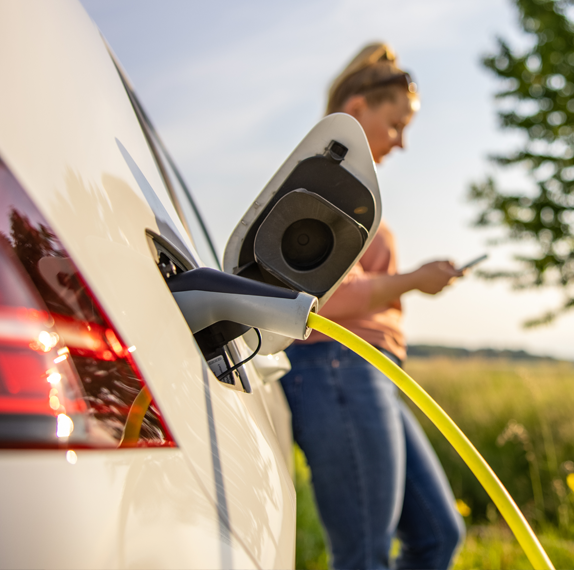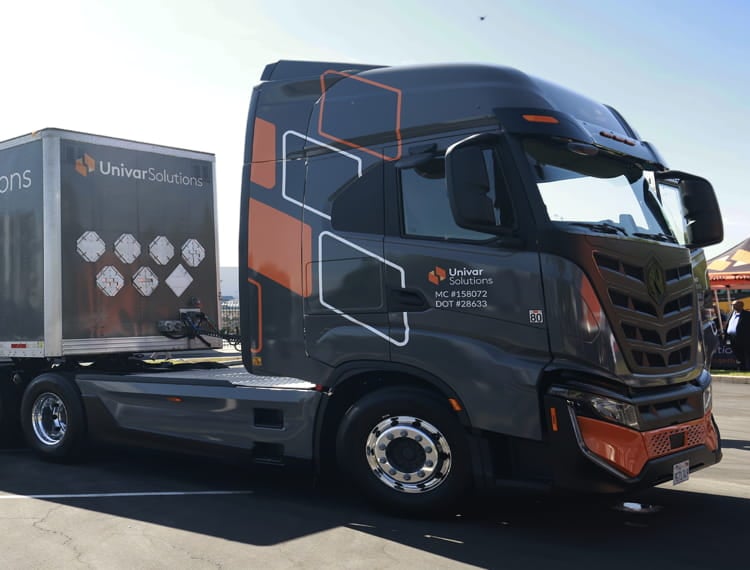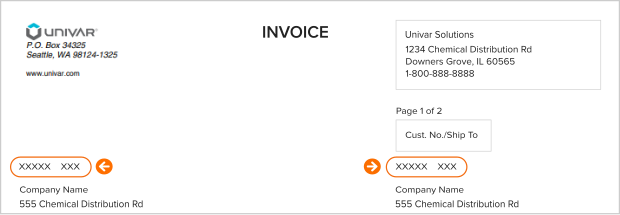We’re here to provide you with more information or help answer any questions you might have. Send us a note and we’ll get back to you as soon as possible.

Climate Action at Univar Solutions
Measuring our progress on our journey toward a net-zero carbon future
Climate change is a pressing issue today, and we recognize the importance of addressing it for a better tomorrow. We are committed to adopting appropriate measures and best practices to help mitigate climate risks and the associated impacts on our business operations. Our short-, medium- and long-term goals are designed to ensure our global operations are continuously working toward carbon neutrality.
Eliminating emissions from our supply chain is vital for combatting climate change. We are committed to adopting appropriate measures and best practices to mitigate climate risks and the associated impacts on our business operations. The actions we take today will have a significant impact in future years.
Learn about how we are monitoring and mitigating energy use throughout our supply chain, from the products we source and services we procure to the end of life of our products.
Where we take action
Univar Solutions’ approach to climate change and energy use is based on (1) optimizing energy efficiency, (2) using electrical power where possible for heating, ventilation, air conditioning, plant equipment and transportation and (3) diversifying our fuel sources. These three categories are core to our strategy on emissions reduction.
Infrastructure and Investment
- Committed to invest $3 million annually in low-carbon technology across the business
- Developing on-site renewable energy production and procurement
- Increasing use of non-conventionally powered vehicles
Processes and Procedures
- Integrating sustainability considerations into service and infrastructure procurement.
- Rolling out site sustainability assessments to key locations across EMEA and North America
- In 2023 we published our enhanced climate risks and opportunities assessment, supporting our strategy on emissions reduction.
Culture
- We continue to make sustainability training a standard part of our employee learning.
- Employee recognition programs focused on advancing our ESG goals
- Promoting sustainability action among Univar Solutions employees on a day-to-day basis
Univar Solutions’ approach to climate change and energy use is based on (1) optimizing energy efficiency, (2) using electrical power where possible for heating, ventilation, air conditioning, plant equipment and transportation and (3) diversifying our fuel sources. These three categories are core to our strategy on emissions reduction.
Infrastructure and Investment
- Committed to invest $3 million annually in low-carbon technology across the business
- Developing on-site renewable energy production and procurement
- Increasing use of non-conventionally powered vehicles
Processes and Procedures
- Transitioning to increased procurement of electrified FLTs and hybrid cars
- Rolling out site sustainability assessments to key locations across EMEA and North America
- Beginning in 2022, reporting in line with TCFD, SASB and GRI frameworks
Culture
- 80 percent of all employees globally completed sustainability training in 2021
- Employee recognition programs focused on advancing our ESG goals
- Promoting sustainability action among Univar Solutions employees on a day-to-day basis
2023 Performance Highlights
The report tracks Univar Solutions’ progress against its ESG targets over the past year and shares 2023 metric highlights including:
- Scope 1 & 2 emissions reduced 19.90 percent from baseline .3
- First ever Scope 3 emissions reduction target set
The report tracks Univar Solutions’ progress against its ESG targets over the past year and shares 2022 metric highlights including:
- Delivered significant progress on environmental goals:
- Reduced our absolute Scopes 1 and 2 emissions by 16.31 percent from our baseline.1
- Disclosed our second year of Scope 3 emissions and delivered reductions in key areas, resulting in an intensity reduction of 25.26 percent of our overall Scope 3 emissions.2,3
- Increased share of renewable electricity to 10.29 percent of
all electricity use.




Our emissions reductions progress and initiatives
In determining the key levers required to address sufficient emissions reduction activities, we have examined the impacts of our activities and assets and the degrees of opportunity we have in order to positively impact emissions reductions, while assessing the financial impacts and opportunities.
Key levers to reduce emissions to meet our goals by 2025 and 2030 include:
- Energy efficiency activities, including investments in more efficient plant equipment such as lighting, heating and cooling systems, compressed air systems and insulation.
- Distributed energy generation, including on-site solar power systems.
- Renewable energy procurement including use of low and zero-emissions market-based instruments for procured electricity.
- Fleet routing optimization such as streamlining service provision to reduce mileage.
- Reducing fleet emissions per mile by using lower emissions tractor units, including exploring expansion of low and zero emissions vehicles.
The significant reductions in emissions that we have seen are a testament to the hard work of our teams and the impact of the plans they have delivered on.
Other factors underpinning our progress include secondary benefits of reduced consumption tied to the reduction of our operational footprint; reduced travel and lower occupancy in our offices following COVID-19; and reduced energy use and emissions outside of our sustainability strategy.
We also have several initiatives across Europe, the Middle East and Africa to support the global goal of carbon neutrality by 2050. These programs included launching a new company car policy that limits emissions from business travel and encourages usage of hybrid and electric vehicles. We installed solar panels at sites in Spain that satisfy one third of required energy demand, and purchased 35 new trucks with Euro 6 engines to increase telematics to track and improve driver behavior, fuel efficiency and reduce emissions.
Additionally, we have expanded our investment in solar arrays at the Paulínia site in Brazil, as part of our wider strategy to increase our on-site renewable energy generation capacity. This is our largest solar project to date.
Through 2023 we have strengthened our emissions reduction and climate mitigation plans and refined our key emissions reduction levers required to achieve our near-term and medium-term goals.
The achievement of these Scopes 1 and 2 emissions reduction activities are closely assessed for the impact these will have on our business, including the capital investments required, operational leases and the return on investment we anticipate due to these climate change mitigation activities. These financial impacts are integrated into our business strategy and our financial planning. The investments and expected returns are reviewed periodically by the Company’s senior management and the ESG Committee of the Board of Directors.
While Scope 3 emissions is not part of our emissions reduction and climate change mitigation activities in 2023, we recognize its importance in our value chain. In addition to tracking our Scope 3 emissions globally since 2021, in early 2024 we have for the first time set a Scope 3 emissions reduction goal.
We are constructing a new, highly innovative logistics Univar Solutions facility in Abbotsford, British Columbia. The new facility is strategically located close to where Univar Solutions’ products and services are to be delivered and offers a much more streamlined and efficient delivery process.
Some key highlights of our new facility:
- Contains a telemetry system for real-time product inventory and high storage capacity
- Equipped with higher rail capacity and blending rooms, which are designed for solvents, corrosives and oxidizers for higher efficiency and lower incidental risks
- Minimizes spillage incidents and protects our employees through a state-of-the-art engineering controls and containment strategy


Footnotes
1. Baseline for goals to 2025 and 2030 is calculated from the average of 2019 and 2020 performance.
2. Historic figures reported in this report may differ from those in previous reporting. This is due to purposeful restatements, details of which are
provided in the Behind the Report section.
3. Reductions in emissions related to Scope 2 emissions were based on Market-based emissions for baseline and current year.





